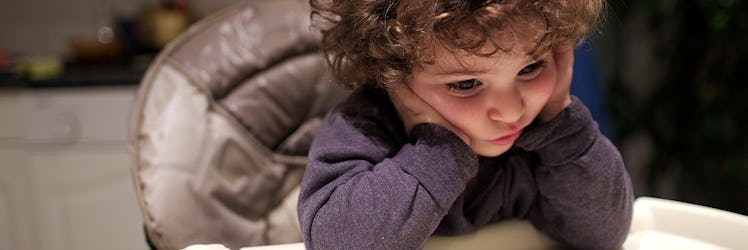How To Discipline A Toddler Consistently And Effectively
"Repetition, reaction, and reassurance." Parenting changes everything, even the 3 R's.

Try explaining the finer points of how your toddler’s life choices (i.e. chewing on your iPad cable) are affecting your overall happiness. Seriously, go ahead. How’d that work out for you? They mostly just laugh at your screwed-up looking face? Right, then. Now try figuring out how to discipline a toddler. Actually, you don’t have that kind of time. Just read this, instead.
First, an infuriating truism about discipline: Not everything works for all kids or in all situations, yet consistency is key to ensuring your kid understands limits and knows right from wrong. Another truism: There are a lot of cooks in this kitchen. For example, you could listen to this world-class child psychologist, who says one thing. Or you could ask a Marine Corps drill instructor, who will say something else. Or you could ask the American Academy Of Pediatrics (AAP), which will introduce you to 3 basic concepts:
- Natural Consequences: “Drop your cookie out of the jogging stroller downtown? Sucks, young’n. No more cookie for you.” The idea is that eventually, to keep eating the cookie, they’ll teach themselves to hold onto it for dear life.
- Logical Consequences: “Enjoying throwing that NERF ball at my sack, are we? NERF ball goes bye-bye for the day.” The consequence here is a logical action taken by an authority figure, in this case rooted in the goal of being able to one day make another child.
- Withholding: A materialistic silent treatment wherein you take away something the child digs (unless they need it to live, like food). That distinction probably shouldn’t have to be made, but hey, some people suck.
This is a good time to remember: you are not one of those people. You’re not being awful, even though disciplining your special little miracle may make you feel awful. This distinction is important for everyone’s safety and sanity. As long as the rules are clear, consistent, consistently enforced, and administered calmly, you are not awful. The AAP has additional guidelines and tips that include being aware of what your kid can and cannot do and understand, and learning from your own mistakes if you do briefly delve into jerkdom.
Whatever method you do try, it’s key to remember that kids rarely learn things the first time around, your response to their behavior sets the tone for what comes next, and you have to discipline with empathy. Since you have more than enough on your plate, shorten all that to the “3 R’s of Discipline“: repetition, reaction, and reassurance. Now go test what you just learned on your toddler, because while you were reading this they were definitely getting into something.
This article was originally published on